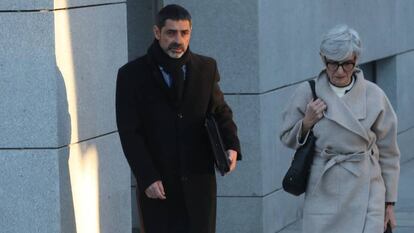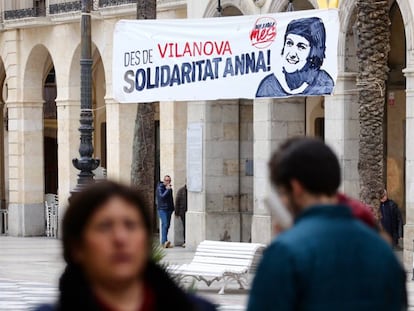Support for Catalan independence falls to 40.8%, new survey shows
Poll released on same day that ex-chief of Catalan police appears in court over October 1 referendum

Support for independence has dropped in Catalonia ever since Madrid temporarily revoked the region’s powers of self-rule, a new survey by the Catalan government’s Opinion Studies Center (CEO) shows.
The poll, which was conducted in January, shows that 40.8% of Catalans support secession from Spain, compared with 48.7% in October.
Asked what organizational structure Catalonia should have, 36.3% of respondents said “an autonomous community,” the system currently in place, compared with 27.4% in October. And 32.9% said they wanted “an independent state,” down from 40.2% in the previous poll.
Another 21.9% favored “a State within a federal Spain,” up from 19.4% in October, while 6.6% defended “a region,” up from 4.6%.
Police chief in court

The survey was released on the same day that the former chief of the Catalan police, Josep Lluis Trapero, appeared before Spain’s High Court (Audiencia Nacional) to answer charges of sedition in connection with the illegal independence referendum of October 1, 2017.
Trapero was head of the Mossos d’Esquadra police force, which is widely believed to have passively stood by instead of stopping the banned referendum from taking place. National Police and Civil Guard officers were sent in to halt the vote instead, leading to scenes of violence that made world headlines.
Trapero was charged with giving out “generic and ambiguous” orders to his officers. The accusation noted that the Mossos “remained in the sidelines” while the other officers followed court-mandated orders to prevent the referendum from taking place. The Mossos even “avoided acting when members of said law enforcement agencies were being assaulted,” said Judge Carmen Lamela in her writ.
But following his court appearance, the judge ignored the prosecution’s request to set bail at €50,000, and let Trapero go with the same precautionary measures already in place in connection with another sedition probe that he is involved in.
Political impasse
Meanwhile, the Catalan parliament is planning to hold a plenary session next week to discuss the political impasse that resulted from the regional election of December 21, when separatists secured a majority but failed to produce a legally valid candidate to head the next government.

On Friday, Junts per Catalunya (Together for Catalonia) filed a court motion defending the legitimacy of ousted premier Carles Puigdemont to be reinstated in the post after his removal by Madrid. Puigdemont fled to Belgium to avoid action by the Spanish courts in connection with the failed secession bid, and has attempted to become a long-distance premier who would govern from abroad.
But parliament bylaws forbid a candidate from attending the investiture debate remotely, and Puigdemont refuses to return to Spain on the grounds that he will be arrested. The house speaker Roger Torrent has indefinitely postponed the debate to choose a new premier, as separatist parties negotiate alternatives – including the possibility of giving Puigdemont a symbolic premiership and presenting another candidate to the post in Catalonia.
Also on Friday, the Catalan Socialists (PSC) filed a motion of their own asking parliament to set the clock running again and, if no viable candidate emerges in the next two months, to call fresh elections.
English version by Susana Urra.









































